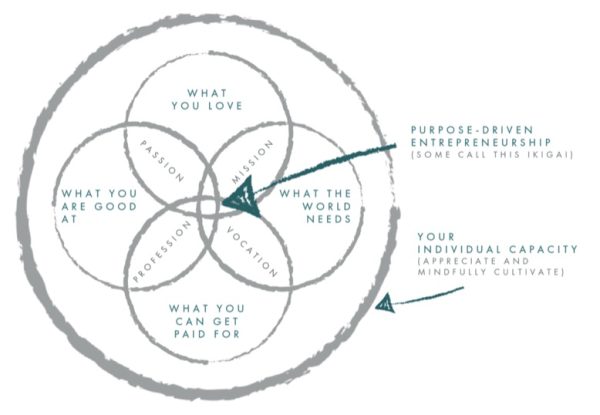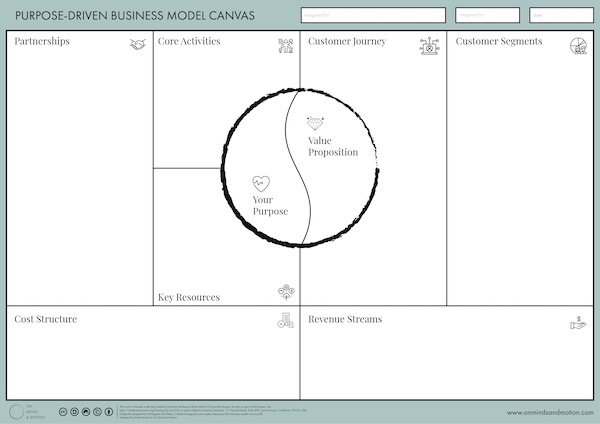Entrepreneurial Mindfulness Being—Striving—Thriving
Entrepreneurial Mindfulness: These two words are not often seen together.
 However, business schools that teach a startup course would do mankind a service to have them as a key component of their teaching*. People planning new ventures will be more likely to prosper if they create a mindful startup.
However, business schools that teach a startup course would do mankind a service to have them as a key component of their teaching*. People planning new ventures will be more likely to prosper if they create a mindful startup.
A friend of mine, Dr Malte Krohn describes entrepreneurial mindfulness as the art of “being while striving”, believing that entrepreneurs have both great power and responsibility—doing well by doing good. Malte, a PhD has written an important book, The Mindful Startup, after many years study of innovation and entrepreneurship.
He acknowledges that if you set out to start a business, you will discover that it’s a journey not a destination, hence he warns you that you’ll strive to reach your purpose, and that you’ll need to stay mindful of that purpose.
Entrepreneurial Balance
The reason to stay mindful of purpose is for personal balance. A study by Michael Freedman of the University of San Francisco showed that compared with the general population, startup founders are:
- twice as likely to suffer from depression;
- six times more likely to suffer from ADHD;
- three times more likely to suffer from substance abuse;
- ten times more likely to suffer from bipolar disorder;
- twice as likely to have a psychiatric hospitalization;
- twice as likely to have suicidal thoughts.
From my own experience of startup, I know the risks. Even if you don’t face mental illness, the challenge to maintain balance is very significant. In those far off days of last century, we talked about staying centered, never quite knowing what that meant. Entrepreneurship tends to be obsessive and a 24/7 preoccupation. Multitasking is a way of life and is the enemy of balance. Entrepreneurial mindfulness is the way to maintain balance.
Entrepreneurial Purpose
Malte’s work is strongly influenced by the Japanese concept of Ikigai, meaning ‘a reason for being’. He modifies the concept for entrepreneurs as ‘entrepreneurial purpose’. It inevitably produces tension for all entrepreneurs.

As an aged entrepreneur, I go further tan Malte and see the journey as: being—striving—thriving, assuming that you want your startup to be purpose driven and consequently profitable. At the same time, I wholeheartedly support Malte’s contention that the entrepreneur must mindfully become aware and cultivate self-compassion—at the core of entrepreneurial mindfulness.
It is for this reason that Malte has adapted the Business Model Canvas to reflect Purpose as well as the startup’s Value Proposition. At the very initial phases of the new venture creation defining purpose and seeing it connected to all the other aspects of business planning, it is much more likely to become deeply embedded in the bloodstream of the business.

From my own entrepreneurial journey, I agree with Malte that any enterprise begins deep inside the founder. He says that it’s up to you to decide whether “the constant change and ambiguity of a dynamic global society is a threat or opportunity.” Either may lie behind the purpose of you deciding to start a business. It will not minimize the extreme uncertainty of your journey, but it will define why you are setting out to make a difference. Maintaining entrepreneurial mindfulness will give you the best chance of success.
Entrepreneurial Stress Reduction
All the evidence, my own included, shows that starting a new venture and keeping it going in the early stages is highly stressful. When authors talk about work/life balance, they assume that you have a choice and in most occupations you can make choices about maintaining such a balance. On the entrepreneurial journey however, you simply do not. Yet it’s important to maintain your mental health, in order to ensure the success of the enterprise.
So, the choice is not between either work or life, but to take whatever steps are necessary to integrate the two, because, as an entrepreneur, you will never be able to turn off the work ‘tap’. Well-being and stress reduction should not be taken lightly. It will require very careful attention and self-compassion. Personally I have had a meditation practice for thirty years or so, and wish that I’d started before my first startup in 1982.
My friend, Malte, asks the rhetorical question, “What does it mean to ‘become’ an entrepreneur?” There are many academics who spend their life trying to answer that question. At the crudest level it is very likely that it means that you will becoming one on a 24/7 basis. It is a way of being. You won’t turn the ‘becoming’ on and off. Even at my own advanced age, in my gut I am still an entrepreneur, even though I don’t have a business, nor am I planning a startup any time soon. So how is it possible to maintain your well-being?
Entrepreneurial Wellbeing
 Successful entrepreneurs integrate being and doing. One of the most immediate ways to act on integration and giving space to being, is to stop and to breathe consciously.
Successful entrepreneurs integrate being and doing. One of the most immediate ways to act on integration and giving space to being, is to stop and to breathe consciously.
Take a look at my advice to pause for breath. Whether or not you think meditation could be the way to go, consider one of these free breathing apps. I use iBreathe (I’m a Mac person)—it’s easy-to-use, has simplicity in mind and it does not contain any clutter. Here’s a good guide to many breathing apps (including iBreathe), for both iOS and Android.
You may laugh at the simplicity of taking 10 inhales and exhales in a controlled, timed and focused way, but even such a short breathing exercise can really help you to practice entrepreneurial mindfulness.
Entrepreneurial Flow
As an entrepreneur, your tendency will always be to be thinking about the future and how you can make your venture more successful: what’s the next pivot needed? You are never satisfied, and that’s why you find it hard to ‘turn off’. Therein lies the challenge: to keep yourself in the flow—and that means being awake and mindful of what is going on. When you get distracted, by a new idea, a sudden intuition, the urgency to collect data… that is when you need to train your mind to return to the present moment.
I lived for many years on the island of Corsica and regularly sailed my dinghy single-handed off the Mediterranean coast. In order to keep going and avoid capsize, I needed to be totally present. It was me and the wind—with constant adjustment to sails, rudder and my body position. Other thoughts, anxieties, to-do lists were never part of mindful sailing. Being in the flow was continuous while on the ocean.
Malte is very clear about the importance of the present moment, especially while the goal-directed behavior of entrepreneurs is part of their nature. To maintain the flow, while allowing the seeming paradox and natural tension between the being and doing (entrepreneurial mindfulness) is what differentiates between entrepreneurial success and failure.
* Four propositions from Dr Malte Krohn on integrating meditation and mindfulness practice into entrepreneurial training and education:
- have a positive effect on entrepreneurs’ pursuit of a socially, or sustainability driven enterprise;
- help entrepreneurs to effectively turn their purpose into goals and actions;
- have a positive effect on entrepreneurs’ decision making skills;
- support entrepreneurs in taking care of their well-being and mental health.






